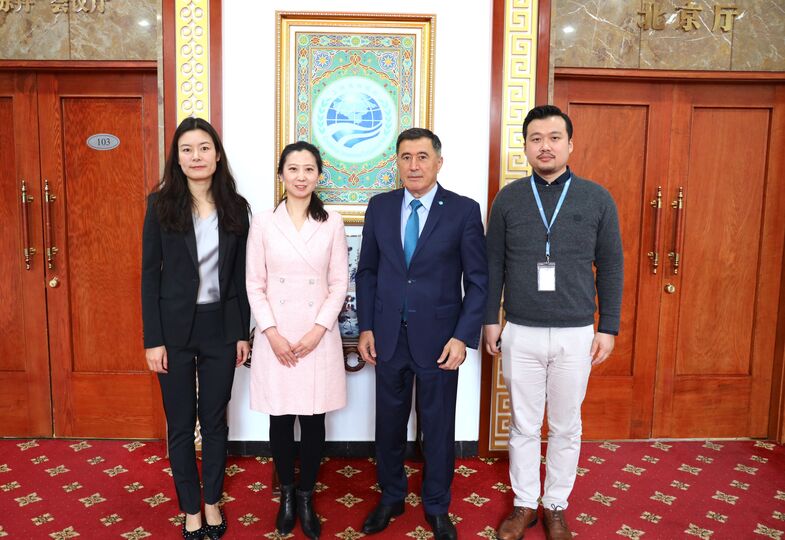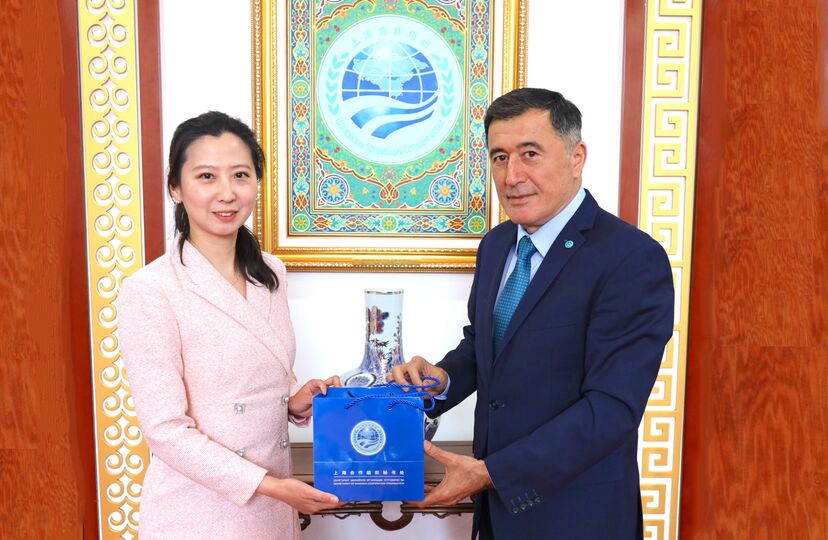On 3 March 2021, SCO Secretary-General Vladimir Norov had a working meeting with Ms Meng Liu, Head of Asia and Pacific
Networks, UN Global Compact.
During the event, the SCO Secretary-General briefed Ms Meng Liu on the SCO's socio-economic activities linked with promoting and implementing Sustainable Development Goals.
During the event, the SCO Secretary-General briefed Ms Meng Liu on the SCO's socio-economic activities linked with promoting and implementing Sustainable Development Goals.
In this context, he noted that the SCO prioritised efforts to fight poverty, to implement youth and gender policies and to work in the field of healthcare, environment, e-commerce and economic digitalisation, as well as cooperation in the sphere of transport, trade and entrepreneurship. Mr Norov also said that the goals and tasks, set forth in the SCO development Strategy until 2025, largely coincided with the Sustainable Development Goals.
The SCO Secretary-General pointed out that the SCO had established solid partnership with the UN and its specialised agencies. This partnership continues to expand and grow ever stronger each year and encompasses new areas.
According to Mr Norov, the Joint Declaration on Cooperation between the Secretariats of the SCO and the UN, signed on 5 April 2010 in Tashkent, as well as the resolution on Cooperation between the United Nations and the Shanghai Cooperation Organisation adopted by the 73rd Session of the UN General Assembly on 30 August 2019. The document opens up many wide-ranging opportunities for regular contacts between the SCO and this universal multilateral organisation and its agencies.
He said that the SCO has already established cooperation with a number of UN agencies, such as UNODC, UNESCAP, UNCTAD, UNESCO and FAO.
Ms Meng Liu noted the importance of the efforts made by the SCO in promoting Sustainable Development Goals and said that the UN Global Compact had launched an action platform called Sustainable Infrastructure for the Belt and Road Initiative in June 2020. The goal of the platform is to more rapidly achieve development goals under the UN Millennium Declaration. The platform mostly aims to mobilise economic operators of countries, parties to the Belt and Road Initiative, in the process of implementing the ten UN Global Compact principles that aim to more quickly attain Sustainable Development Goals. The sides concerned will mostly see to it that businesses make a specific contribution to this process in line with the principles of openness, mutual understanding and trust.

She voiced interest in establishing cooperation with the SCO member states, as regards the advancement of Sustainable Development Goals in the field of industrial, infrastructure and innovation development, the implementation of the youth policy and the fight against poverty and unemployment. In this context, they noted the importance of a consultative contribution by the business community of the SCO countries to the process of accomplishing the relevant tasks.
In this connection, Ms Meng Liu noted an intention to invite business organisations of countries, parties to the SCO process, to join the Platform. Information about details and the types of cooperation will be compiled and submitted in the near future, she added.
Ms Meng Liu suggested implementing the first stage of bilateral cooperation and holding an online webinar / presentation of an action platform Sustainable Infrastructure for the Belt and Road Initiative for the SCO member states.
The UN Global Compact is an international business initiative in the field of corporate social responsibility and sustainable development. Established in 2000, at the initiative of former UN Secretary-General Kofi Annan, the UN Global Compact became an important tool for involving businesses in formulating and advancing the sustainable development concept.
The UN Global Compact facilitates and displays a new approach towards the very essence of business which tries to discard the concept of profits at any cost and sides with society, while sharing and jointly creating common values in the interests of humankind and Nature and the entire planet. The UN Global Compact has made a major contribution to assessing the reliability and prospects of any business in the inter-related economic, environmental, social and ethical contexts.
The mission of the UN Global Compact is to mobilise a global movement of responsible companies that share and implement joint ethical principles, known as the Ten UN Global Compact Principles, in various political, economic, environmental, cultural and geographical conditions. The Ten UN Global Compact Principles deal with human rights, labour relations, environmental protection, anti-corruption efforts and also support Sustainable Development Goals and help achieve them.
The UN Global Compact primarily involves companies of any size and category of property, as well as organisations and non-profit associations working with businesses in the context of the sustainable development agenda.
Their CEOs openly support the initiative's mission and assume obligations of the UN Global Compact's participants. Their fulfillment is confirmd by a regular progress report. The UN Global Compact brings together over 12,000 participants from 160 countries representing over 68 million of their employees and staff.
